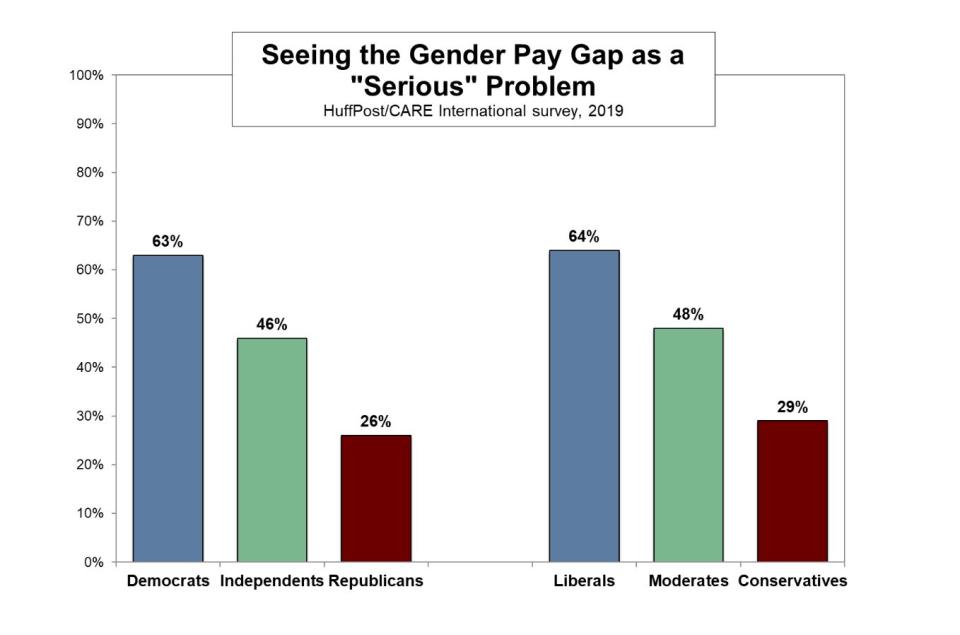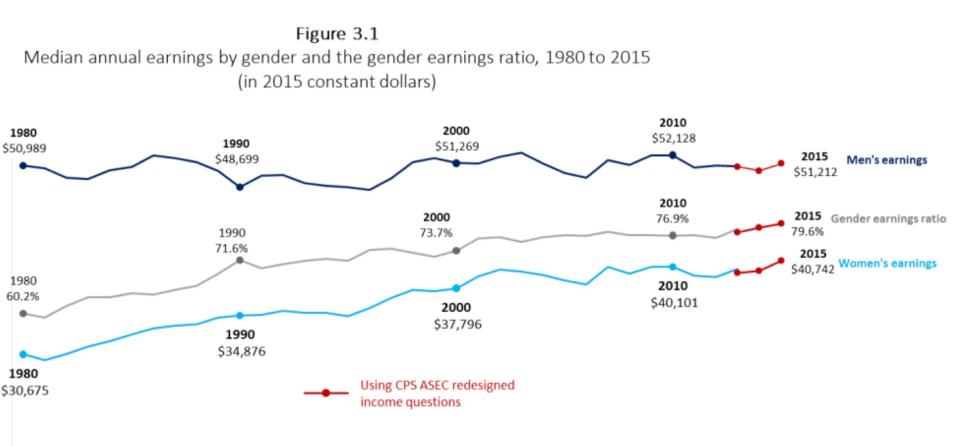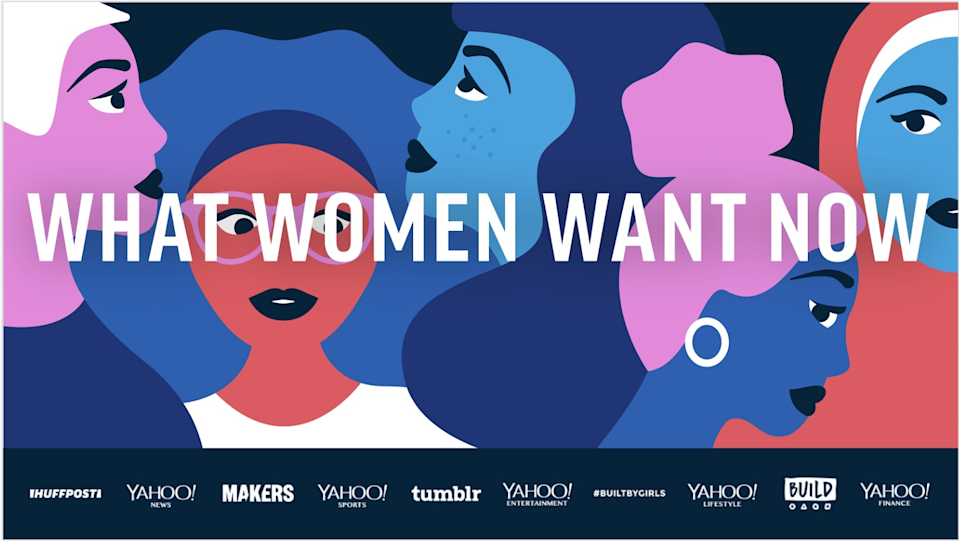Democratic and Republican women disagree sharply on pay equity
What Women Want Now is a program by Yahoo Finance and her sister sites dedicated to creating content about the issues and stories that matter most to women. Read more at WhatWomenWantNow.tumblr.com. Join the conversation with #WhatWomenWantNow.
Democrats and Republicans don’t agree on much. But among women, a majority on both sides agree that gender-based pay inequity is a problem.
Still, liberal and conservative women disagree about how serious that problem is. According to a new survey of 1,008 women produced for HuffPost, Yahoo, and CARE by Langer Research Associates, 63% of Democratic women but only 26% of Republican women see the gender pay gap as a serious problem.

Among women who identify as Democrats or liberals, about 90% said pay inequity is a problem versus about 60% among female conservatives or Republicans.
‘It compounds over time’
Kim Churches, CEO of the American Association of University Women (AAUW), a nonprofit organization that advocates equity for women and girls, was not surprised that most women agree on the issue of pay inequity.
“Women are faced with the pay gap and the leadership gap every single day as they pursue their educational dreams, enter the workforce, and continue throughout their careers,” Churches told Yahoo Finance. “It compounds over time. The majority of women know that the pay gap is harming the economic security for families.”
Women made 60.2% of what men earned in 1980. Since then, the number has gone up to 80%, according to the most recent Census data (though that data does not compare salaries and wages for men and women in similar jobs).

Rachel Greszler, a research fellow at the Heritage Foundation, a conservative think tank, acknowledged that there’s a pay gap but that “there’s definitely agreement” among conservatives that it’s “greatly exaggerated.”
“When you take into account and compare people more apples to apples, you see that there’s not as big of a pay gap as reported,” Greszler said. “It doesn’t account for all sorts of things that make up what an individual earns, including their education, their hours a week, their choice of career field, and all sorts of things that factor into pay.”
According to a 2017 Pew Research survey, 25% of working women stated they’ve earned less money than a man doing the same job, versus only 5% of men who said the same of a female peer.
Phyllis, a Democrat from Georgia who took the survey, told Yahoo Finance that gender-based pay inequity is a serious problem.
“A lot of families are single-parent families, especially in minority communities, as well as in the larger society where women are the primary breadwinners,” she said. “If they’re not getting paid as much as their male equivalents, then they have difficulties meeting the needs of their family, which not only affects them as individuals, but the entire family, the community, and society.”
‘Everything in the U.S. is becoming a partisan issue’

One of the most notable gaps among women is between those who supported Hillary Clinton in 2016 and those who voted for Donald Trump. The survey found that 68% of Clinton voters say gender-based inequity is a serious problem, versus just 23% among Trump supporters.
The Heritage Foundation’s Greszler said the disparity between the views of Democratic and Republican women on the issue “boils down the role” that liberals versus Republicans see for the government versus the individual.
“There’s a fundamental difference there — whether the government or whether employees have the information that’s necessary to determine workers’ value and thus set their wages based on the contributions that those workers make,” she said. “Liberals tend to think that pay should be a function of a job title, while conservatives think that pay should be more tied to performance.”
Kay, a Florida-based survey participant who is Republican, told Yahoo Finance that women need to step up on their own to ensure they’re getting equal pay.
The solution to fixing gender pay inequity is “by women standing up and saying, ‘either you give me the same pay as the other guy, or I will walk,’” she said.
“We are not locked into a job,” Kay said. “We know we’re not slaves. We’re not indentured servants.”

In some cases, she suggested, women may get paid less money than men because they’re given more flexibility.
“Women need to realize that we want the whole ball of wax, and sometimes, we just can’t have it. So is he getting paid because he didn’t take any sick days last year because his wife did to take care of the children?” Kay noted. “And then we had to take 20 or 30 days of sick leave because our children had the flu, the mumps, or the measles? We need to look at the whole picture. If your boss is lenient enough to let you take sick days, but the other guy gets the rewards for not taking them, you have to [accept] that.”
Kim Churches of the American Association of University Women argued that the pay gap isn’t a partisan issue, or at least shouldn’t be. “This is just common sense and pragmatic and practical that human beings doing the same work at the same title with the same level of experience, skills, and assets should be paid equally,” she said.
So why is there still a divide? “To be honest, some of it is the language we use around these issues,” she said. “Everything in the United States is becoming a partisan issue because we’re using nouns, adjectives, and verbs that stir our bases.”

This HuffPost/Yahoo/CARE survey was conducted by telephone Jan. 21-30, 2019, among a random national sample of 1,008 adult women, with 71% reached on cell phones and 29% on landlines. Results have a 3.6 percentage point error margin for the full sample, including design effects due to weighting. The survey was produced by Langer Research Associates of New York. N.Y., with field work by Issues & Answers of Virginia Beach, Va.
Adriana is an associate editor for Yahoo Finance. Follow her on Twitter @adrianambells.
READ MORE:
Follow Yahoo Finance on Twitter, Facebook, Instagram, Flipboard, LinkedIn, YouTube, and reddit.
